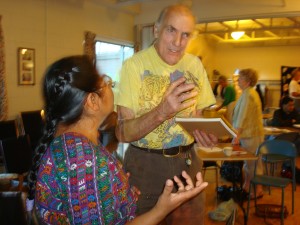Eastern Tour: Halifax – “The Little Changes We Make ARE Important”
Early this morning we left St. John’s amidst a rain storm that luckily did not keep us from Halifax. I was sad to leave, as we had received such a warm welcome from the Presentation Sisters who had provided us with accommodation (and many hugs!).
Upon arrival in Halifax, we went to the office of the Council of Canadians where they graciously allowed our “entourage” to set up a make-shift media room for Naty to be interviewed by Bethany Horn from OpenFile, an online publication profiling partners participating in the People’s Summit in Toronto.
We then had a delicious meal overlooking the harbour. Naty and Isaiah have been travelling for a few days now and fatigue is somewhat setting in. However, they are always eager to share their stories and always willing to chat with people who wish to hear more about the realities of climate change in the Global South. I have been struck by the number of similarities in the struggle to maintain land and resources between the two partners.
Tonight’s event at St. Andrew’s United Church in Halifax was a success, drawing a diverse crowd. Billy Lewis, a local Indigenous speaker, started off the evening by welcoming the group. Isaiah noted in his presentation the importance of changing the way people look at climate change to a more rights-based perspective. The theme of changing the way we look at the environment and its protection, as well as the way we view progress, overlaps consistently in the discussions around questions about sustainability. What struck me about Naty’s presentation was the importance of looking at technologies that place humanity before profit.
I left tonight thinking about how Billy spoke of local groups working together to educate about home-grown climate disasters and alternatives, and about Isaiah speaking about the solidarity he felt when talking at the last two events, and about how Naty pointed out that the little changes we make in our lives and households ARE important, and that collectively and politically we can make changes that will assist in long-term sustainable communities.




